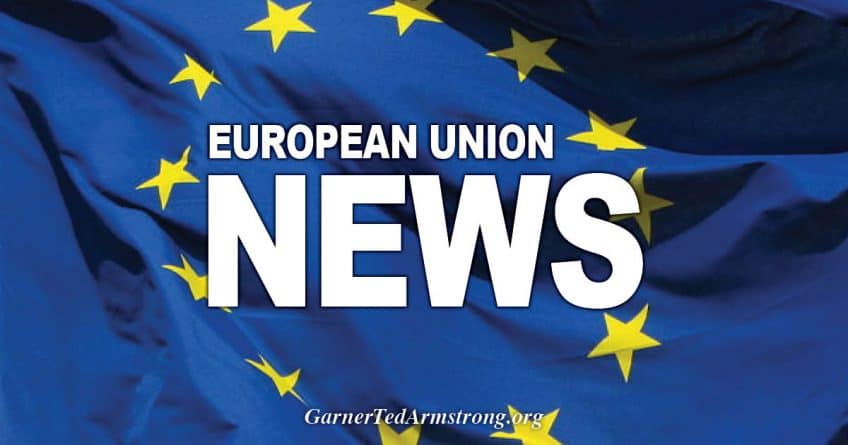
A computer screen shows news about the Brexit as a broker watches his screens at the stock market in Frankfurt, Germany, Wednesday, Jan. 16, 2019. – Copyright AP Photo/Michael Probst
The post-Brexit fallout came faster than many had expected. On January 4, the first trading day of 2021, almost €6 billion of EU share trading left London for other European capitals.
Then earlier this month came the news that Amsterdam had overtaken London as Europe’s biggest share trading centre, as daily volumes fell sharply in the City and surged in the Dutch capital.
In 2019, when the United Kingdom was still inside the European Union and its single market, 43% of trading in EU stocks took place in the UK. The first few weeks of this year have seen the proportion plunge to just 4%, according to analysis by the think tank New Financial.
The City’s commanding position on the global financial stage is not in doubt — but recent events in Europe raise questions as to how far the balance of power may shift from London to other capitals.
“You can lose liquidity very quickly, and finance is very adaptive,” says Nicolas Véron, Senior Fellow with the Brussels-based Bruegel think tank and the Peterson Institute for International Economics in Washington. “So the fact that London has so much liquidity and has had so much liquidity in recent times doesn’t mean that liquidity will stay there.”
“Basically the established position of a financial centre is not to be taken for granted going forward, if the conditions that created that position are no longer there,” he told Euronews.
Amsterdam’s post-Brexit boost
The sudden flight in trading activity is the most striking example of financial sector movement from the UK to the EU since the end of the post-Brexit transition period at New Year.
But Amsterdam is picking up business from London in other areas too. Analysis by data provider IHS Markit shows a shift in euro-denominated derivatives trading to the Dutch capital, with the figures showing the UK losing market access to the EU in nearly all categories.
The Netherlands has reported a general drop in inward foreign investment in 2020 due to the pandemic. But so-called “Brexit companies” — UK firms seeking to offset disruption and extra red tape by setting up operations in the EU — are an exception.
Annual results published on February 18 by Invest in Holland and the Netherlands Foreign Investment Agency reported an increase in the number of such companies focusing on the Netherlands.
Nearly 80 made a partial move last year and the NFIA says it is talking to 550 about relocation or expansion — including in the Dutch financial sector.
“Before we start becoming euphoric about this, Brexit is not good for the Netherlands… In the end, the Netherlands has lost their second trading partner,” says NFIA spokesman Michiel Bakhuizen. Nevertheless, he told Euronews, the country is attractive for financial companies as it helps offer solutions to Brexit-related problems.
“So for instance, when we talk about traders or FinTech companies, we have a multilingual, highly skilled workforce, we have the right infrastructure, both in terms of travelling in and out of the country to direct destinations in and outside of Europe, close digital connections with a fast network in and around specifically Amsterdam, and a very good working and living environment.”

The EU’s specialist cities
Research by New Financial suggests that more than 400 UK-based financial services firms “have moved something somewhere to the EU in response to Brexit”. Of these, 128 have chosen Dublin, while Paris has attracted 88, Luxembourg 84, Frankfurt 56, Amsterdam 47, and Brussels 10.
The think tank’s founder and Managing Director William Wright says the relocations reveal a clear tendency for cities to specialize across different financial sectors.
“The vast majority of the relocations to Dublin are in asset management and to a lesser extent, alternative investments. The vast majority of firms moving to Frankfurt are banks, or investment banks; the vast majority of firms moving to Amsterdam, exchanges, trading platforms, brokers,” he told a Peterson Institute panel discussion.
“Paris is the only one that doesn’t have that deep-sector profile. It’s already the largest centre in terms of insurance and asset management in the EU, and it would like to build on both of those, but the distribution of firms that are choosing Paris is much broader.”
Such trends suggest no particular race among European cities to dominate the scene or become the continent’s number one financial hub post-Brexit.
“The reason why not all will gather in one place is very simple: there isn’t really an incentive for that,” adds Véron. “There is a lot of activity to absorb and it’s more economical for firms to scatter it across different centres than all go to the same place and have a kind of overheating effect.”

The UK’s battle for ‘equivalence’
UK firms had long known that as a result of Brexit they stood to lose full “passporting rights”, stripping away the blanket access to operate in Europe they had before.
However, so far the EU is also refusing to grant the UK a much lesser form of access known as “equivalence” — given when Brussels considers a third country’s regulation to be as robust as its own. Being deprived of this further hinders the City’s ability to trade unhindered in Europe. Instead, UK firms have to comply with individual states’ requirements.
Financial services were never scheduled to be part of the post-Brexit trade agreement, and duly took a back seat while negotiations focused on the likes of fishing rights.
In the deal itself, both sides merely agreed to agree at a later stage. This did not prevent Boris Johnson from putting a typically shiny gloss on its provisions.
“There’s some good language about equivalence for financial services, perhaps not as much as we would have liked, but it is nonetheless going to enable our dynamic City of London to get on and prosper as never before,” the British prime minister said on Christmas Eve, the day the agreement was struck.
The “good language” he referred to, set out in an annex to the main deal, amounts to no more than a commitment to cooperate on regulation and preserve financial stability. By March 2021 both sides aim to agree a “Memorandum of Understanding” to establish a framework, but expectations as to the content are low.
Brussels has control
The UK has granted the EU equivalence, meaning that EU banks can operate in UK markets. But whether the EU does likewise will be entirely up to Brussels.
The European Commission’s assessment of the Brexit deal bluntly says the EU “will consider equivalence (decisions) when they are in the EU’s interest”. So far it has granted the UK just two temporary agreements from a possible 39.
The EU’s chief Brexit negotiator Michel Barnier has said since that more clarification is needed on British plans. National authorities will be on the lookout for UK firms seeking to get around new restrictions, he added.
“I think there is a widespread narrative in the UK that there will be somehow a negotiation about financial services, but I don’t see that happening,” says Bruegel’s Véron. “Equivalence, as the Joint Declaration (attached to the Brexit trade deal) made extremely clear, is not a negotiation, equivalence is a unilateral decision.”
And, he adds, he does not expect that to come any time soon. “The one thing that has a deadline in terms of the equivalence process is equivalence on clearing houses which only runs till May 2022, so the Commission must decide to extend or not, that’s a very significant market segment. Otherwise there’s nothing in the pipeline,” he told Euronews.
In a speech this month, Bank of England Governor Andrew Bailey said it would be unfair of the EU to impose tougher rules on the UK than it has on other non-EU countries, insisting that Britain could not accept becoming a “rule-taker”.
There have also been warnings that if the EU is too hard on the UK, the main winners may not be on the continent but in other global financial centres such as New York.
How badly will the EU’s squeeze damage the City?
Sir Mark Boleat, the City of London’s political leader from 2012-17, has warned that the loss of City-related tax revenue from Brexit could be £10 billion (€11.55 billion) a year — and that the impact will be felt by the country, not City firms.
“For them, having to move a number of staff and functions (to the EU) is a costly irritant, but no more than that. The financial services industry has survived Brexit very well. The damage is not to the industry at all, it is predominantly to Britain,” he told the Peterson Institute panel.
The think tank New Financial says in its report into Brexit’s initial impact that it expects City relocations to the EU to continue. But it adds there is “a danger in overstating the risk” of EU barriers to UK financial trade and concludes that “Brexit dents but does not fatally undermine” London’s dominance as a financial centre.
The UK Chancellor of the Exchequer (finance minister) Rishi Sunak said in January that Brexit would help reinforce the UK’s “pre-eminent” global position and provided an opportunity to regulate “differently and better”.
As for UK access to EU markets, the European Union’s current restrictive stance comes against a backdrop of tension between London and Brussels. In the future, Véron argues, the regulatory process is bound to be influenced by the broader “political atmospherics” of the UK-EU relationship, as well as financial considerations.
“There are still a lot of moving pieces even now that the UK has left the single market,” he told Euronews.
“If the relationship between the EU and the UK is pretty good generally, that will tilt the agencies’ stance towards more openness. If the relationship is very bad and characterized by a complete breakdown of trust, that means the agencies will have more restrictive stances.”








